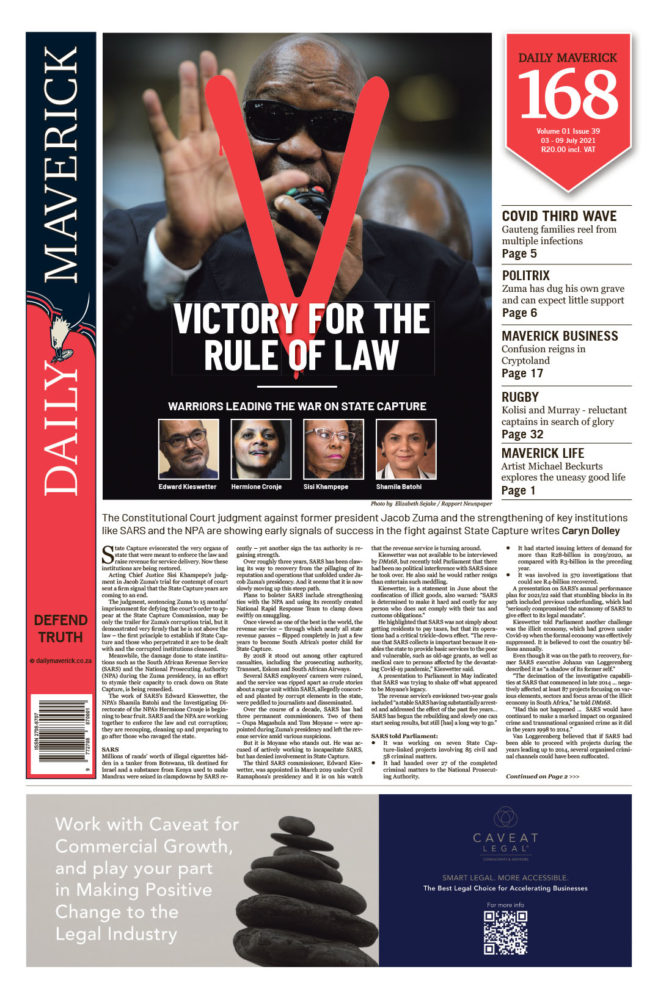The economic scarring of Covid-19 may have new political consequences for South Africa’s democracy.
First published in the Daily Maverick 168 weekly newspaper.
It seems counterintuitive, but South Africa’s response to the economic shock of Covid-19 may deepen the income inequality and disparity in living standards that were already a gruesome albatross around the country’s neck even before the pandemic struck.
The economic scarring likely to result from prolonged low economic growth and high unemployment may also have the kind of consequences that politicians are loath to openly admit, especially three months before an election.
The sour-sweet scent of New Year’s fireworks had hardly dissipated when the World Bank announced in January that South Africa would suffer losses to per-capita income gains that would push back progress by a decade or more. It’s a tough stat to swallow, considering that, in the decade up to 2019, the country had already seen GDP growth average a paltry 1.4%, way below population growth, and per-capita income, an average measure of wealth per person, stagnate at $7,345, lower than it was before the Global Financial Crisis. A quarter of a decade into democracy, 10% of South Africans control more than 80% of national income.
More recently, less remarked-on signs of plunging living and wealth standards, in addition to the bewildering if not now abstract data-dumps on unemployment, are emerging, despite the money the government pledged to spend – about R500-billion – in its fiscal response to the pandemic. Reserve Bank governor Lesetja Kganyago has admitted that deep cuts to lending rates, bringing them to record lows, has disproportionately benefited those South Africans who already have access to interest-bearing assets like bonded property, pensions and financial investments.
The Treasury has stopped its Social Relief of Distress grant, the monthly R350 lifeline to millions of unemployed, and has said it cannot introduce a Basic Income Grant despite some compelling evidence that it supported consumer spending and prevented many from sliding into absolute poverty.
The low rates of inflation in 2020, accompanied by higher rates of household savings, also mask a galling paradox: prices have remained low because there is no demand in the economy, meaning consumers are spending less even as items get cheaper, a function not only of deep uncertainty about how long they will be able to draw wages but also rising deprivation. This has also led to slower growth of salaries, partly due to the pay freeze for public sector workers and the pause to big increases in private sector wages that preceded the pandemic. In all, real wages shrank 3.8% in 2020.
Banks are also understandably reluctant to provide new loans to households and businesses, and have tightened lending standards considerably. The proof can be seen in the slack credit demand and money supply figures, as well as plummeting consumer and business confidence measures. The political consequences, beyond a growing unhappiness with the government that manifests in service protests, increasingly fractious relations between labour, business and state, and a slide in voter participation, are a little harder to discern.
Credit rating agencies have warned of the risk of social unrest, but these warnings have been in the kind of nebulous language that avoids talking directly about what that unrest could look like.
A 2020 study by a Swiss university looking at the polarising effect of lower and differentiated living standards on public life provides some interesting possibilities that are partly corroborated in the febrile tone of SA’s political space. Study author Nemo Kruger finds that in developed economies the kind of housing boom triggered by low interest rates creates winners and losers that leads to increased material and cultural polarisation and feeds into a political conflict pitting more conservative, traditional political groupings against anti-system parties.
“Put simply, while the latter oppose not democracy per se but only its liberal version, the former are its champions,” Kruger says. That is, political subjectives tend to realign and harden as material economic benefits become scarcer and distributed disproportionately, leading more people to see democracy and a more liberal regime of civil rights and procedural rules as an obstacle to prosperity. Being “anti-system” becomes more a life-and-death issue than a moral contest.
It is perhaps a long-winded way of repeating the potent cliché, “it’s the economy, stupid”. DM168
This story first appeared in our weekly Daily Maverick 168 newspaper which is available for free to Pick n Pay Smart Shoppers at these Pick n Pay stores.



